 Libri di Loy David R. su Unilibro.it
)
Libri di Loy David R. su Unilibro.it
)
|
|
2022 |
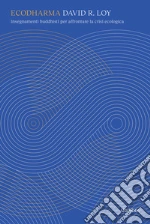 Title :
Ecodharma. Insegnamenti buddhisti per affrontare la crisi ecologica
Title :
Ecodharma. Insegnamenti buddhisti per affrontare la crisi ecologicaAuthor: Loy David R. Publisher: Ubiliber Due domande sono cruciali in Ecodharma: come può il buddhismo aiutarci a rispondere all'eco-crisi? E cosa significa questa crisi per la nostra pratica e la comprensione degli insegnamenti? David R.Loy presenta la situazione. "Il cambiamento climatico", dice, "è solo la proverbiale punta dell'iceberg". Molteplici e interconnessi sono, infatti, i problemi ambientali con cui dobbiamo confrontarci, e la radice di tutti è l'incomprensione di noi stessi e del mondo. Traccia così un'analisi convincente e completa di come la saggezza buddhista possa aiutare, e suggerisce di praticare nella natura, dove l'interdipendenza di tutti gli esseri viventi risulta ovvia. È sufficiente entrare in un bosco per riscoprirne la connessione: senza troppe elucubrazioni mentali ci si rende conto che il mondo non è un insieme utilitaristico di cose separate, ma una confluenza di processi che includono l'intera umanità. Propone numerosi insegnamenti fondamentali, come i precetti e le brahmavihâra, le quattro attitudini mentali o dimore spirituali (mettâ, gentilezza amorevole, karunâ, compassione per la sofferenza degli altri, muditâ, gioia compartecipe, e upekkhâ, imperturbabile equanimità), spiegandone il significato alla luce dell'ecologia. Unendo le diffuse preoccupazioni riguardanti l'ambiente (eco) con gli insegnamenti del Buddhismo (dharma), sottolinea come sia necessario fondere lo sviluppo della consapevolezza interiore con l'impegno sociale, stimolando il lettore a sviluppare una mente ecologica che lo porti a tradurre le idee in azioni concrete. € 16,00
Scontato: € 15,20
|
|
|
1919 |
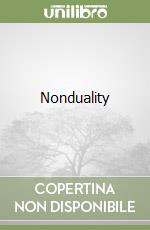 Title :
Nonduality
Title :
NondualityAuthor: David R. Loy Publisher: Wisdom Books € 26,90
|
|
|
1918 |
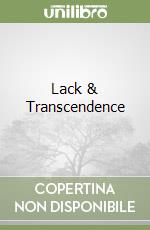 Title :
Lack & Transcendence
Title :
Lack & TranscendenceAuthor: Loy David R. Publisher: Wisdom Pubns € 19,60
|
|
|
1915 |
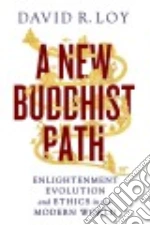 Title :
A New Buddhist Path
Title :
A New Buddhist PathAuthor: Loy David R. Publisher: Wisdom Pubns Engage with a new vision of Buddhism and the modern world with the bestselling author of Money Sex War Karma: Notes for a Buddhist Revolution. David R. Loy addresses head-on the most pressing issues of Buddhist philosophy in our time. What is the meaning of enlightenment--is it an escape from the world, or is it a form of psychological healing? How can one reconcile modern scientific theory with ancient religious teachings? What is our role in the universe? Loy shows us that neither Buddhism nor secular society by itself is sufficient to answer these questions. Instead, he investigates the unexpected intersections of the two. Through this exchange, he uncovers a new Buddhist way, one that is faithful to the important traditions of Buddhism but compatible with modernity. This way, we can see the world as it is truly is, realize our indivisibility from it, and learn that the world's problems are our problems. This is a new path for a new world. € 15,20
|
|
|
1913 |
 Title :
Liquid Chromatography:
Title :
Liquid Chromatography:Author: Fanali Salvatore, Haddad Paul R., Poole Colin F., Schoenmakers Peter, Lloyd David Publisher: Elsevier Science Ltd A single source of authoritative information on all aspects of the practice of modern liquid chromatography suitable for advanced students and professionals working in a laboratory or managerial capacity
€ 182,30
|
|
|
1912 |
 Title :
Funerals
Title :
FuneralsAuthor: Horton R. Anne, Lloyd Trevor (INT), Stancliffe David (ILT) Publisher: Church House Pub € 14,80
|
|
|
1910 |
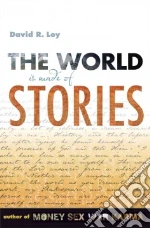 Title :
The World Is Made of Stories
Title :
The World Is Made of StoriesAuthor: Loy David R. Publisher: Wisdom Pubns In this unique and utterly novel presentation, David Loy explores the fascinating proposition that the stories we tell ? about what is and is not possible, about ourselves, about right and wrong, life and death, about the world and everything in it ? become the very building blocks of our experience and of the universe itself. Loy uses an intriguing mixture of quotations from familiar and less-familiar sources and brief standalone micro-essays, engaging both the reader and himself in challenging and illuminating dialogue. As we come to see that the world is made ? in a word ? of stories, we come to a richer understanding of that most elusive of Buddhist ideas: shunyata, the "generative emptiness" that makes up all forms. Reminiscent of Zen koans and works of sophisticated poetry, this book rewards both casual reading and deep reflection. € 15,20
|
|
|
2009 |
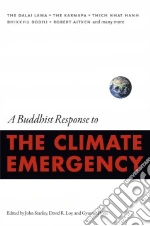 Title :
A Buddhist Response to the Climate Emergency
Title :
A Buddhist Response to the Climate EmergencyAuthor: Stanley John (EDT), Loy David R. (EDT), Dorje Gyurme (EDT) Publisher: Wisdom Pubns Today, we are confronted by the gravest challenge that humanity has ever faced: the ecological consequences of our collective actions. What role can Buddhism play in our response to this global predicament? Can Buddhist traditions help us meet this challenge successfully? Should we focus on prayer and meditation or social action? This book shows that it's possible to do both. It presents the hard science of global warming and solutions to the crisis from a Buddhist perspective, together with the views of leading contemporary teachers. The Dalai Lama, Chatral Rinpoche, Sakya Trizin, Thich Nhat Hanh, Joanna Macy, Joseph Goldstein, Lin Jensen, and other eminent voices address topics such as peak oil, deforestation, renewable energy, and breaking the addiction to fossil fuels in essays that are both meaningful and mindful. Prayers for the planet, along with steps we can take individually and as a society, offer hope and inspiration. € 15,20
|
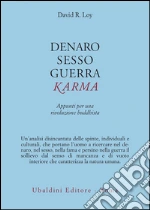 Title :
Denaro, sesso, guerra, karma. Appunti per una rivoluzione buddhista
Title :
Denaro, sesso, guerra, karma. Appunti per una rivoluzione buddhistaAuthor: Loy David R. Publisher: Astrolabio Ubaldini David Loy spoglia il buddhismo dei suoi caratteri più esotici legati alle culture orientali e si concentra sui concetti fondamentali: il dukkha, l'insoddisfazione che permea l'esistenza umana nel mondo, e l'assenza di un io individuale, permanente e immutabile nel tempo, indipendente dall'altro. Con questa chiave di lettura passa ad analizzare tutti i modi con cui noi occidentali tentiamo di colmare questo vuoto ontologico che mina ogni senso di sicurezza: accumulando denaro, inseguendo l'illusione del sesso e della notorietà, persino impegnandoci in una guerra dopo l'altra per sentirci, paradossalmente, più vivi. Ecco allora i tre veleni evidenziati dal Buddha: l'avidità, la malevolenza e l'illusione, o ignoranza della vera natura delle cose. Secondo l'autore, e qui il discorso si fa davvero nuovo e particolarmente profondo, nella società moderna i tre veleni hanno assunto una posizione istituzionalizzata: l'avidità nel sistema economico consumistico e fondato su un eterno incremento dei profitti, la malevolenza nelle industrie belliche che hanno saputo escogitare persino la guerra "preventiva" pur di moltiplicare i propri guadagni, e l'illusione nel potere dei media, una sorta di "sistema nervoso di gruppo", che manipolano e distorcono le nostre percezioni. € 17,50
Scontato: € 16,63
|
|
2008 |
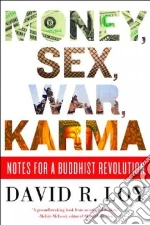 Title :
Money, Sex, War, Karma
Title :
Money, Sex, War, KarmaAuthor: Loy David R. Publisher: Wisdom Pubns David R. Loy has become perhaps the greatest advocate of the Buddhist worldview's ability to transform the sociopolitical landscape of the modern world. In this, his most accessible work to date, he offers clear presentations of oft-misunderstood Buddhist staples ? the working of karma, the nature of self, the causes of trouble on both an individual and societal scale ? while also inviting readers to examine topics closer to home, such as ?Why We Love War” and the real reasons behind the sense of never having enough time, money, sex, security, or anything else. His ?Buddhist Revolution” is nothing less than a radical change in the ways readers can approach their lives, the environment, the collective delusions that pervade modern culture, and even spirituality itself. Bracing yet ultimately hopeful and empowering, Money, Sex, War, Karma offers positive tools for contributing to societal change. € 14,30
|
|
|
2006 |
 Title :
Pests & Diseases of Herbaceous Perennials
Title :
Pests & Diseases of Herbaceous PerennialsAuthor: Gill Stanton, Cloyd Raymond A., Baker James R., Clement David L., Dutky Ethel Publisher: Independent Pub Group Geared for professional perennial growers, this updated reference helps growers fight the most important factors leading to plant loss: insect and mite pests and diseases. The destructive pests are each given a chapter, with headings covering identification, life stages, monitoring, and controlling each species of each pest. Similar chapters do the same for diseases?with disease updates from the U.S. and international markets added. The lists and descriptions of beneficial organisms have been updated to reflect the latest research and successes, while an entirely new section has been added, comprised of four smaller chapters about controlling pests and diseases in four staple crops?Anemone x hybrida, Aster, Hemerocallis (daylily), and Hosta. The final section, A Visual Record of Plant Damage, includes 156 photos arranged by perennial species, showing damage from pests and diseases that can be used to help troubleshoot crop problems. € 47,80
|
|
|
2003 |
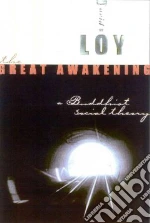 Title :
The Great Awakening
Title :
The Great AwakeningAuthor: Loy David R. Publisher: Wisdom Pubns The most essential insight that Buddhism offers is that all our individual suffering arises from three and only three sources, known in Buddhism as the three poisons: greed, ill-will, and delusion. In The Great Awakening, scholar and Zen teacher David Loy examines how these three poisons, embodied in society's institutions, lie at the root of all social maladies as well. The teachings of Buddhism present a way that the individual can counteract these to alleviate personal suffering, and Loy boldly examines how these teachings can be applied to institutions and even whole cultures for the alleviation of suffering on a collective level. This book will help both Buddhists and non-Buddhists to realize the social importance of Buddhist teachings, while providing a theoretical framework for socially engaged members of society to apply their spiritual principles to collective social issues. The Great Awakening shows how Buddhism can help our postmodern world develop liberative possibilities otherwise obscured by the anti-religious bias of so much contemporary social theory. € 15,20
|
|
|
2002 |
 Title :
A Buddhist History of the West
Title :
A Buddhist History of the WestAuthor: Loy David R. Publisher: State Univ of New York Pr Roy (international studies, Bunkyo U., Japan) explores the Western desire to ground oneself or make oneself feel more real, arising from a self-conscious ungroundedness which we experience as a sense of lack . Using a contemporary Buddhist perspective, the author discusses ways that our understanding of this sense of lack has changed at important points in history, and the largely unconscious ways in which we have tried to resolve our lack. Issues covered include freedom, progress, delusive craving (for fame, romantic love, money), modernity, civil society, the "means/end problem in modern life," and the modern economic system. Earlier drafts of some of the chapters have been previously published in academic journals and books. Annotation c. Book News, Inc., Portland, OR (booknews.com) € 32,90
|